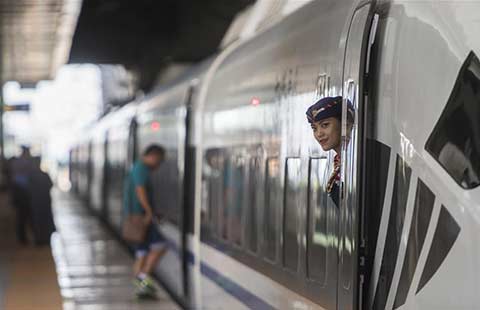Chinese e-commerce services bring wealth, opportunities to 'Belt-Road' countries
(Xinhua) Updated: 2016-08-15 17:39ALMATY - Chinese e-commerce services has brought more wealth and opportunities to Kazakhstan and other countries encompassed in China's Belt and Road Initiative.
AliExpress, the global shopping portal of Chinese e-commerce giant Alibaba, is becoming a new favorite among Kazakhstan's young generation between the age of 25 and 30.
Take fancy to Aliexpress
Young people in Kazakhstan take a fancy to shopping on AliExpress, an online retail service made up of mostly small Chinese businesses offering products to international online buyers.
Mitet Zhumabaev, a citizen from Kazakhstan's largest city Almaty, told Xinhua that he got to know AliExpress by chance and found that millions of Chinese products were sold on the online shopping site. He frequently visits the website, saying that it's very easy and safe to use, and that he would buy products with good consumer reviews.
"AliExpress provides an excellent buying experience," Zhumabaev said, adding that the average delivery time for free shipping usually takes one or one and a half months, while express shipping normally takes less than two weeks.
Kazakhstan, which relied heavily on its energy and resources industries, has a less developed light industry and mainly depends on imports to meet the needs for daily necessities.
However, thanks to cross-border e-commerce services, the Kazakh people can now purchase Chinese products with good quality and at an inexpensive price without leaving home.
AliExpress Country Station Director Liu Wei told Xinhua that AliExpress promoted its brands overseas mainly by word of mouth, and that it is a leading e-commerce website in Russia, Spain and Israel which enjoys great popularity.
AliExpress has become one of the top ranking online trading platforms in Kazakhstan, with clothes, home appliances and digital products being the favorites of local consumers, according to Alexa, a commercial web traffic data provider wholly owned by Amazon.com.
Join hands with Chinese e-commerce
The Belt and Road Initiative, which comprises the Silk Road Economic Belt and the 21st Century Maritime Silk Road, was brought up by China in 2013. The initiative envisions a trade and infrastructure network that connects Asia with Europe and Africa along the ancient Silk Road routes.
Over 70 countries and organizations have voiced support for and willingness to join the initiative.
In May, Kazakhstan's national sovereign wealth fund Samruk-Kazyna led the Kazakh telecom and post companies to sign a memorandum of understanding with Chinese e-commerce giant Alibaba to promote cooperation in e-commerce, payment and logistics.
The central Eurasian country, which borders with China in the southeast and with Russia in the north, marks the start of the Silk Road Economic Belt outside China. Kazakhstan is trying to improve its infrastructure in order to become a transit hub that connects China and Europe, increase the efficiency of freight railroads and promote trade growth.
"Alibaba is optimistic about the outlook of Kazakhstan's potential in cross-border transportation and logistics," said Liu.
The "Khorgos - Eastern Gates" special economic zone, located near the border of China and Kazakhstan, is a logistics center built by the Kazakh government.
Hicham Belmaachi, Chief Operating Officer of the management company of the special economic zone, told Xinhua in an interview that the convenience of international trade will be augmented immensely if land ports in the special economic zone could forge closer cooperation with e-commerce platforms like Alibaba.
It takes only 15 days to send goods via land transportation from Khorgos to Europe, whereas traditional waterway shipping would take as long as 40 days.
Unlike other land ports, the land port in the Khorgos-Eastern Gates special economic zone is of a huge container yard, where products are gathered, classified and shipped to various Eurasian destinations, thus meeting the goal of faster speed and lower cost, according to Belmaachi.
Last year, the volume of freight traffic through Kazakhstan surged over the previous year. According to planning by Kazakh government, the volume of freight traffic processed through the Khorgos-Eastern Gates special economic zone will exceeds 4 million tons in 2020.
Belmaachi believes that the main challenge of trade inter-connectivity lies in ideology, technology and intergovernmental cooperation.
People need time to accept new stuff and new ideas, Belmaachi said. China's Belt and Road Initiative creates fresh opportunities of regional trade cooperation. "We look forward to cooperation with Chinese ports and e-commerce companies," he added.
Proposal to establish eWTP
In a recent Business 20 (B20) meeting, business leaders from the Group of 20 (G20) members completed a report on policy advice and will submit it to the upcoming G20 summit.
Among many suggestions proposed in the report, B20 leaders put forward the idea of electronic world trade platform (eWTP), a mechanism for public-private dialogue in cross-border e-trade development.
The new mechanism will improve the current trade framework and help small and medium-sized enterprises (SMEs), developing countries, women and the young generation participate in the global economy, said Alibaba founder Jack Ma, chair of B20 SME development taskforce.
Ma said that if the Belt and Road Initiative can facilitate free trade for these people, it will bring profound changes to the world economy.
The initiative represents China's responsibility as a big power and the second largest economy, Ma said, adding that it will not only bring new opportunities to SMEs, but will also enlarge the size of the middle class, and promote social stability and economic development.
However, against the backdrop of a global economic slowdown and rising protectionism, the main challenge to implement the eWTP lies in the coordination of efforts by different countries.
Based on the operation and practice of AliExpress, Liu pointed out, the level of each country's cross-border logistics varies greatly, and depends mainly on the country's infrastructure and government support.
It's not easy to promote our business overseas, Liu said. But the "Belt-Road" countries are more likely to support our business, especially in areas of promoting logistics infrastructure and import policies optimization.
- Chongqing witnesses cross-border ecommerce boom
- Ecommerce brings new business, opportunities to China Commodities City
- Alibaba launches AliExpress, targeting US market
- Bank of China and UKTI launch white paper on cross-border ecommerce
- China's Belt and Road Initiative conducive to efforts to carry out UN sustainable development agenda
- Chinese e-commerce services bring wealth, opportunities to 'Belt-Road' countries
- Auto part-maker confident of China's economy
- China-standard bullet trains start operation
- Pension funds cut to bone in more provinces
- China stocks close at 7-month highs on stimulus hopes
- Only authentic Australian honey sold to China: Capilano CEO
- Land of the rich: More ultra-wealthy in Guangdong than Beijing
- RMB may rebound after reaching bottom

















